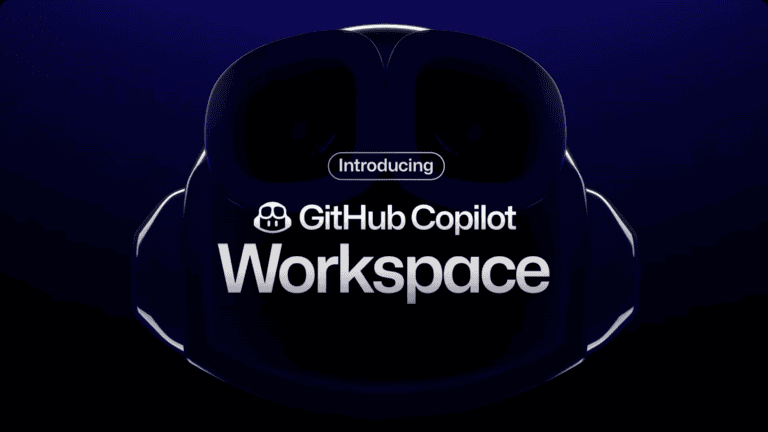GitHub Copilot has expanded once again. Workspace, currently in technical preview, promises AI assistance at every step of the development process. What exactly does it entail?
GitHub Copilot made its debut back in October 2021. Ever since, the AI development platform has iterated continuously. It’s now GPT-4-enabled and has included many targeted AI features via “Copilot X”. Everything from code generation and the refining of pull requests to answering questions on technical documents is already in the Copilot suite. Now GitHub is adding to the feature set once more. Copilot Workspace offers comprehensive AI assistance from the very start of a software project. That sounds like it should keep software engineers awake, but what exactly does Workspace do?
At work
Workspace can take a look at the current state of a project on GitHub and suggest changes. It explains those changes in concise natural language. The “Copilot-native” development environment seems primarily set up for refining a current codebase. However, the GitHub team also suggests that developers can come up with an entirely new project with help from the tool. Workspace can flesh out a general idea by generating an initial bit of programming code. Other GitHub Copilot features are then ready to tackle any other aspect of software development.
One suggested Workspace use case is adding AI to Pong. Workspace begins by answering a question that appears on a GitHub page: is there already AI in Pong? After a brief analysis, the Workspace tool generates an answer (in this case: no, there isn’t). A user can then add additional information to it on a point-by-point basis. After that, Workspace generates a plan that can be expanded by the user once again. With one additional push of a button, Workspace modifies the files to make the change.
Thus, the user remains in control at all times. Workspace’s thought process can also be clearly followed. Should it unexpectedly take a wrong direction (which is the case with any GenAI tool at times), it can be rectified. The only opaque thing is the under-the-hood AI model itself, developed in collaboration with OpenAI and GitHub parent Microsoft.
The Bard among programming tools
Workspace builds on previous developments within GitHub Copilot. For example, GitHub Copilot Chat appeared several months ago and basically offers a repackaged version of the stand-alone features that made up Copilot X. Things like code review, pull requests, writing documentation – AI help has long been offered within the GitHub Copilot suite in these areas.
The thrust of Workspace is to function as a “rubber duck” or “thought partner”, says one GitHub developer on YCombinator. “We also find that it’s just super helpful to take an idea and make it more tangible/concrete.” They argue that a Workspace session sparks discussion within a team and simplifies the step to implementation. All with just a few clicks (and even on a smartphone).
It is very reminiscent of the explanation Google CEO Sundar Pichai gave when Google debuted Bard (now Gemini) last year. There, too, programming assistance was promised, albeit in a limited way. The promise was mainly to act as a “thought partner” and “to bounce ideas off” off. GitHub Copilot Workspace limits itself to coding tasks to be more accurate, but the promises are as nuanced as with Bard.
Is AI programming the future?
Despite these nuances, many news organizations are rather bombastic on the subject of AI programming help. For example, GitHub Copilot is said to be the beginning of the “automation of the coding industry”. Problems abound, however: allegations of plagiarism besmirched the AI tool’s reputation shortly after its launch.
Since then, the limitations of AI code have become increasingly apparent. For example, debugging generated code is seen as especially tedious, since AI often makes very different mistakes than a human. Also, large code bases are unsuitable for analysis, since (current) AI models have a limited context window (which in essence is the AI’s short-term memory). Assistance is limited to specific tasks, small refinements and solving already defined problems. The fact that Copilot Workspace focuses precisely on this task is therefore not surprising. Even starting a project, which is as interpretable as it can be, offers AI the chance to freewheel harmlessly with ideas as a “thought partner.”
No Devin, no worries
What Copilot Workspace is not, is a full-fledged AI software engineer. The implementation of GenAI within GitHub is above all modular, even as Workspace and Copilot Chat unify various AI components. Therefore, Workspace is not meant to complete an entire codebase with a few clicks.
The promises are more economical than what we saw with Devin from startup Cognition AI. That debuted in March as “the first AI software engineer,” although it is still in beta. Once that tool sees the light of day, we’ll be able to look past its stunning benchmarks and know whether software engineers should really look for another job. At least Workspace doesn’t work that suggestion. Ultimately, humans still have to come up with good ideas on their own, with AI lending a hand.
Also read: Devin is the first AI software engineer: should developers be worried?
